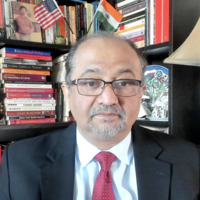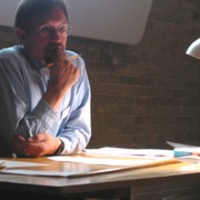Academic Papers by Mariya Ivancheva
SSRC Items, 2022
For years, even before the Covid-19 pandemic, Venezuelans have been leaving their country due to ... more For years, even before the Covid-19 pandemic, Venezuelans have been leaving their country due to rising economic insecurity and political conflict. Now, due to the pandemic, many face new or heightened forms of precarity, in particular as they seek work in countries in which their skills may not match labor market needs, or as they are excluded from opportunities due to their outsider status. Here, Mariya Ivancheva and Jesica Lorena Pla examine how Venezuelan migrants in Argentina worked through the pandemic, eliciting and analyzing their reflections on job security and sense of stability, as well as how their experiences in Venezuela shape their views of Argentina and back home.

New Technologies in Work and Employment, 2022
This paper considers how the formal and real subsumption of academic labour in UK higher educatio... more This paper considers how the formal and real subsumption of academic labour in UK higher education are exposed and exacerbated by the move towards online teaching, assessment and communication. These processes have been expedited by the COVID-19 pandemic outbreak and attention is drawn to the technology-driven organisational and operational innovations that are transforming academic divisions of labour and labour processes. These changes, particularly in relation to the separation of research and teaching, and to the deprofessionalisation, modularisation, and outsourcing of the latter, are the focus of the paper. We argue that the formal subsumption of knowledge production (research) through commercialisation dovetails with a real subsumption of socially reproductive work (teaching) that is undergoing qualitative transformation in an increasingly marketised higher education sector. We show how digitalisation actively contributes to the growing standardisation and flexibilisation of work, deepens long-standing gendered divisions of labour, and dissolves even further the blurred work/life boundaries for precariously employed workers. These new hallmarks of the contemporary subsumption present new challenges to workers and their collective organisations in Higher Education.

ephemera journal, 2021
This article seeks to reconsider the concept of precarity by bringing in the discussion of care. ... more This article seeks to reconsider the concept of precarity by bringing in the discussion of care. An increased academic interest in the subject of precarity and precarious working conditions in advanced, post-industrial economies is often premised on the false binary of precarity-stability. While stable working and living conditions have historically been a privilege of a minority of autonomous individuals, engaged in productive work, free from direct dependence or dependents, women and marginalised groups are often made more precarious, as their highly exploitable labour assets are not given any, or certainly not an equal value. And while stability at work can destabilize precarious lives of people with care responsibilities and marginalized groups, who need flexibility in order to navigate their lives, subjecting the affective domain to the principles of the market does not offer an effective solution to the inequalities between productive and reproductive labour. The article works on three different levels-the critique of ethnocentrism and androcentrism of the concept of precarity, the introduction of precarious living conditions into the discussion of precarious labour, and the insistence on the necessity to insert solidarity, care and love back into our workplaces as a way to resist capitalist competitiveness and alienation. We also warn against the risk of such care labour being exploited by a next cycle of capitalist appropriation. Reviewing a range of empirical studies, we explore the ways in which care destabilizes the neat boundaries between precarity and stability. We argue that repositioning care as a central activity in all human production and reproduction, both outside paid labour and inside it, allows us to see more clearly potential venues of exploitation and liberation within the predicament of precarity.

This report presents the results of the survey conducted among EASA members in 2018. The survey ... more This report presents the results of the survey conducted among EASA members in 2018. The survey was a collaboration between EASA and the PrecAnthro Collective, whose members have worked together and mobilised since 2016 to raise awareness about the challenges of developing an academic career in anthropology. The themes explored in the survey reflect existing academic research on changes to the academic profession and the casualisation of labour in Europe and beyond. The survey enquired into the extent to which and how trends already documented in other disciplines, and in academia as a whole, affect anthropologists. These trends include a growing division between research and teaching, the deprofessionalisation of academic labour through multiple contract types, the imperatives of international mobility and cyclical fundraising, and weak labour unions. This report captures overall trends as well as regional differences in the anthropological profession in Europe.
TOC:
1. Acknowledgements
2. Executive summary
3. Background
4. Methodology and the research sample
5. Basic characteristics of EASA survey participants
6. Employment and academic career
7. Combining work and private lives
8. Mobility
9. Workplace
10. Discrimination
11. Representation of interests
12. Conclusions and recommendations

British Journal of Sociology of Education, 2020
Abstract
The advent of massive open online courses and online degrees offered via digital platfor... more Abstract
The advent of massive open online courses and online degrees offered via digital platforms has occurred in a climate of austerity. Public universities worldwide face challenges to expand their educational reach, while competing in international rankings, raising fees and generating third-stream income. Online forms of unbundled provision offering smaller flexible low-cost curricular units have promised to disrupt this system. Yet do these forms challenge existing hierarchies in higher education and the market logic that puts pressure on universities and public institutions at large in the neoliberal era? Based on fieldwork in South Africa, this article explores the perceptions of senior managers of public universities and of online programme management companies. Analysing their considerations around unbundled provision, we discuss two conflicting logics of higher education that actors in structurally different positions and in historically divergent institutions use to justify their involvement in public–private partnerships: the logic of capital and the logic of social relevance.
Libre Pensamiento, 2020
La universidad ha sido siempre un espacio de producción de intelectuales. Sin embargo, en los últ... more La universidad ha sido siempre un espacio de producción de intelectuales. Sin embargo, en los últimos años esa torre de marfil en la que una élite intelectual trabajaba en condiciones privilegiadas se está viendo asediada por políticas neoliberales que imprimen un carácter empresarial a la investigación y a la producción de conocimiento. La brecha entre el trabajo intelectual y otras formas de trabajo la salva hoy un denominador común: la precarización; una precarización a la que, en general, las organizaciones sindicales no han sabido dar respuesta.

Matter: Journal of New Materialist Research, 2020
Unbundling is the process of disaggregating educational provision into its component parts likely... more Unbundling is the process of disaggregating educational provision into its component parts likely for delivery by multiple stakeholders, often through public-private partnerships and the use of digital approaches (Swinnerton et al., 2018). A neutral definition, it relates to a process that is all but neutral to higher education. Having done research on unbundling South African and English universities, on a project focused on teaching and learning processes, I could not help but realise the extent to which this process affects much more than student learning and online teaching material curation patterns. Under the premise of widening access, it contributes to a potentially profoundly gendered casualisation, automation, deprofessionalisation, and fragmentation of academic labour to new unforeseen degrees. In this, unbundling reveals a new frontier of exploitation and exclusion at universities that we need to be aware of and organise against.
*this paper is one out of five contributions to:
Cielemęcka, O. and Rogowska-Stangret, M. 2020, Roundtable discussion: Thinking together from within the times that worry us. Matter: Journal of New Materialist Research, volume 1: 80-109

Journal of Labor and Society, 2019
This article presents the findings of an archival study on the Cold War higher education (HE) exc... more This article presents the findings of an archival study on the Cold War higher education (HE) exchange between Bulgaria and Cuba and Angola carried out at the Open Society Archive. Although research on the internationali-zation of HE mostly focuses on the introduction of new managerial governance and global rankings, scholars studying socialist countries mostly address the intricacies of student exchange. Focusing on policy transfer and expert exchange, I discuss both limitations of the framing of the subject in both Western liberal and socialist official sources and the asymmetries of the exchange between socialist countries. Exploring the exchanges between Bulgaria and Cuba and Bulgarian and Angola, my case study shows that East European socialist countries based on their cooperation with developing countries in the Global South on the premise of dominance of Eurocentric knowledge and extractivist practices in return of knowledge and technology.

Gender, Work & Organization, 2019
This article examines the rise in precarious academic employment in Ireland as an outcome of the ... more This article examines the rise in precarious academic employment in Ireland as an outcome of the higher education restructuring following OECD, government initiatives and post‐crisis austerity. Presenting the narratives of academic women at different career stages, we claim that a focus on care sheds new light on the debate on precarity. A more complete understanding of precarity should take account not only the contractual security but also affective relational security in the lives of employees.
The intersectionality of paid work and care work lives was a dominant theme in our interviews among academic women. In a globalised academic market, premised on the care‐free masculinised ideals of competitive performance, 24/7 work and geographical mobility, women who opt out of these norms, suffer labour‐led contractual precarity and are over‐represented in part‐time and fixed‐term positions. Women who comply with these organisational commands need to peripheralise their relational lives and experience care‐led affective precarity.

Focaal: Journal of Global and Historical Anthropology, 2019
This article presents the results of a collaborative ethnographic inquiry in contemporary Sofia a... more This article presents the results of a collaborative ethnographic inquiry in contemporary Sofia and Caracas. Combining historical research and ethnography, we compare the ways in which a former and a current left-wing regime treat urban squatting. In both cities, squatters tend to be poor families escaping homelessness. In Sofia, "squatters"-usually of Roma origin-inhabit unregulated spaces deemed illegal after 1989. In Caracas, homeless families have been officially encouraged to squat, but not declared legal occupants. A historical comparison shows that both socialist governments turn a blind eye to extra-legal housing practices. Benign, informal housing arrangements function to display solidarity with marginalised groups as a form of popular legitimacy. Yet, without formalised state protection, in both cases, such arrangements produced a "surplus" population, vulnerable vis-à-vis global processes of capitalist reorganisation.

CITE AS:
Gagyi, A. and M. Ivancheva, 2019. "The reinvention of ‘civil society’: transnational co... more CITE AS:
Gagyi, A. and M. Ivancheva, 2019. "The reinvention of ‘civil society’: transnational conceptions of development in East-Central Europe" pp. 55-69 in N. McCrea and F. Finnegan (eds.) Funding, Power and Community Development, Bristol: Policy Press
ABSTRACT
If we take the United Nations’ definition of community development as a ‘process where community members come together to take collective action and generate solutions to common problems’ (United Nations, 2010), East-Central Europe has a rich and ongoing history of such initiatives that have played a decisive role in the build-up of ‘modern’ institutions throughout the region (Stokes, 1986). Thus, East-Central Europe offers rich ground for reflection on how modernity and community development are understood in relation to each other. Yet it should be noted that community development as a specific term has limited currency in East-Central Europe. In fact, it has been a discourse of ‘civil society’ rather than ‘community development’ that has been dominant in the region in making sense of social change from the bottom up. This chapter explores how the notion of ‘civil society’ in East-Central Europe, and the discursive and organisational practices attached to the term, have been deployed in politics and how this has affected how local development and empowerment are conceived and funded. In this respect, struggles over the meaning and practice of ‘civil society’ activism in the region, speak to longstanding debates within the community development field relating to the role of state and market; the status, function and relevance of professionalised organisations within communities; the relationship between political and economic freedoms; and the possibilities for meaningful transnational solidarity.

This paper examines the idea of ‘core-business’ in contemporary South African public universities... more This paper examines the idea of ‘core-business’ in contemporary South African public universities. South Africa’s public higher education system has global ambitions, but is also highly internally stratified. Drawing on new data from interviews with higher education leaders and government policy makers across a number of South African institutions, we show that while the rhetoric of ‘core business’ of the university has been adopted by higher education leaders, the question of what constitutes the purpose of the university, in South Africa and arguably beyond, is subject to ongoing debate and negotiation. The multiplicity of conflicting but coexisting narratives about what universities should do in South African society - producing excellent research, preparing a labour force, or addressing societal inequalities - expose a persisting tension surrounding the purpose of a public university. And while this tension has historical origins, we show that responses to addressing these various roles of the institution are not developed organically and in a neutral context., They emerge under conflicts over limited state funding and attendant and opportune market pressure put on public universities in times of crisis, that shape profoundly their framing and outcomes, and the future of the universities. .

In recent years debates have emerged about rising corporate influence and control over higher edu... more In recent years debates have emerged about rising corporate influence and control over higher education. Considerable attention has been given to developments in the United States, where the process is, arguably, most advanced (Apple, 2005; Hill, 2005). In this chapter we relate these issues to the long standing role of tenure in academic life. We explore the traditions of tenured employment, which many see as a weapon/asset in the struggle against the relentless commercialisation and casualization of higher education. We do not proceed with a view to returning to an imagined golden age (Clarke, 2010), but with a view to transformation, as is required to make the best of the present and to secure the future. With a focus on Ireland, we examine the Contract of Indefinite Duration (hereafter CID), as a peculiar form of tenure: one that permits interpretations that downgrade those employed under its premise. With reference to a number of cases, we examine the struggles that academics face in obtaining these permanent contracts. We consider how the absence of security and stability impacts on people's lives and/or capacity to develop as researchers and teachers. We address deteriorating working conditions, and consider how they prevent a growing number of academics from engaging productively with their colleagues, caring for their students, or even caring adequately for themselves (Lynch, 2010). We suggest that by outsourcing work previously carried out under permanent contracts of employment universities demonstrate a stubborn refusal to contribute to the formation of secure occupational identities among those hoping to live and work as academics. We argue that though CIDs do offer the closest thing to job security amid increasingly destructive commercial forces, such half-hearted solutions can also be used as a tool for antagonizing further the ever more stratified academic community.
--
To be cited as: Ivancheva, Mariya and O’Flynn, Micheal, 2016. Between Career Progression and Career Stagnation: Casualisation, Tenure, and the Contract of Indefinite Duration in Ireland, in: Gupta, S., Habjan, J., Tutek, H. (Eds.), Academic Labour, Unemployment and Global Higher Education. Palgrave Macmillan UK, London, pp. 167–184.
contribution to Rethinking Euro-anthropology, part three: early career scholars' forum. Social An... more contribution to Rethinking Euro-anthropology, part three: early career scholars' forum. Social Anthropology/Anthropologie Social Journal, 24
(3) 353–379. edited by Francisco Martinez © 2016 European Association of Social Anthropologists.
doi:10.1111/1469-8676.12327

After traditional academics mobilized university autonomy against government intervention and sup... more After traditional academics mobilized university autonomy against government intervention and supported the coup d'état against Hugo Chávez, his government created a parallel system of public universities. María Egilda Castellano headed the effort to extend university access to poor Venezuelans. The events of her terms as vice minister of education (1999–2002) and rector of the Bolivarian University (2003–2004) and her subsequent career show the difficulty the Bolivarian government has had in creating sustainable institutions and challenge the applicability of the concept of permanent revolution to the Bolivarian process.
--
Después de que los académicos tradicionales usaron la autonomía universitaria en contra de la intervención del gobierno y apoyaron el golpe de estado contra Hugo Chávez, su gobierno creó un sistema paralelo de universidades públicas. María Egilda Castellano dirigió el esfuerzo por extender el acceso a las universidades a los venezola-nos pobres. Los resultados de su trabajo como vice ministra de educación (1999–2002) y rectora de la Universidad Bolivariana (2003–2004) y su subsiguiente carrera profe-sional demuestran la dificultad que el gobierno bolivariano ha tenido para crear institu-ciones sostenibles y pone en duda la aplicabilidad del concepto de revolución permanente al proceso bolivariano.
The recent history of Venezuela's student movements illustrates the paradox of academic autonomy.... more The recent history of Venezuela's student movements illustrates the paradox of academic autonomy. The student left used autonomy to resist repression during Venezuela's liberal democracy (1958). Yet, after 1998, the former supporters of the parties which had violated that autonomy started to capitalise on it in order to block the progressive reforms. The Bolivarian government's decision not to interfere with autonomous universities , but to create a parallel Bolivarian university system instead repli-cated one of the reform patterns of previous governments. Despite the government's intention to fight inequality, the reform contributed to further stratification of higher education and polarisation among the student movements.

LATISS Journal 6 (1) Spring 2013, 2013
This article discusses paradoxes in the emergent global fi eld of higher education as refl ected ... more This article discusses paradoxes in the emergent global fi eld of higher education as refl ected in an alternative model of the university -the Bolivarian University of Venezuela (UBV) and the related higher education policy, Misión Sucre. With its credo in the applied social sciences, its commitment to popular pedagogy and its dependence on extensive fi eldwork with communities, UBV offers an alternative model of science and research at the service of society. Drawing on my ongoing research on this university (since 2008), I present the diffi culties which the homogenising standards of a global fi eld of higher education pose to a rapidly developing mass public university in a semiperipheral country. I focus on the diffi culty of developing evaluation procedures for UBV as this exposes contradictions which are both unique to this new university model and common for a world system of higher education.











Uploads
Academic Papers by Mariya Ivancheva
TOC:
1. Acknowledgements
2. Executive summary
3. Background
4. Methodology and the research sample
5. Basic characteristics of EASA survey participants
6. Employment and academic career
7. Combining work and private lives
8. Mobility
9. Workplace
10. Discrimination
11. Representation of interests
12. Conclusions and recommendations
The advent of massive open online courses and online degrees offered via digital platforms has occurred in a climate of austerity. Public universities worldwide face challenges to expand their educational reach, while competing in international rankings, raising fees and generating third-stream income. Online forms of unbundled provision offering smaller flexible low-cost curricular units have promised to disrupt this system. Yet do these forms challenge existing hierarchies in higher education and the market logic that puts pressure on universities and public institutions at large in the neoliberal era? Based on fieldwork in South Africa, this article explores the perceptions of senior managers of public universities and of online programme management companies. Analysing their considerations around unbundled provision, we discuss two conflicting logics of higher education that actors in structurally different positions and in historically divergent institutions use to justify their involvement in public–private partnerships: the logic of capital and the logic of social relevance.
*this paper is one out of five contributions to:
Cielemęcka, O. and Rogowska-Stangret, M. 2020, Roundtable discussion: Thinking together from within the times that worry us. Matter: Journal of New Materialist Research, volume 1: 80-109
The intersectionality of paid work and care work lives was a dominant theme in our interviews among academic women. In a globalised academic market, premised on the care‐free masculinised ideals of competitive performance, 24/7 work and geographical mobility, women who opt out of these norms, suffer labour‐led contractual precarity and are over‐represented in part‐time and fixed‐term positions. Women who comply with these organisational commands need to peripheralise their relational lives and experience care‐led affective precarity.
Gagyi, A. and M. Ivancheva, 2019. "The reinvention of ‘civil society’: transnational conceptions of development in East-Central Europe" pp. 55-69 in N. McCrea and F. Finnegan (eds.) Funding, Power and Community Development, Bristol: Policy Press
ABSTRACT
If we take the United Nations’ definition of community development as a ‘process where community members come together to take collective action and generate solutions to common problems’ (United Nations, 2010), East-Central Europe has a rich and ongoing history of such initiatives that have played a decisive role in the build-up of ‘modern’ institutions throughout the region (Stokes, 1986). Thus, East-Central Europe offers rich ground for reflection on how modernity and community development are understood in relation to each other. Yet it should be noted that community development as a specific term has limited currency in East-Central Europe. In fact, it has been a discourse of ‘civil society’ rather than ‘community development’ that has been dominant in the region in making sense of social change from the bottom up. This chapter explores how the notion of ‘civil society’ in East-Central Europe, and the discursive and organisational practices attached to the term, have been deployed in politics and how this has affected how local development and empowerment are conceived and funded. In this respect, struggles over the meaning and practice of ‘civil society’ activism in the region, speak to longstanding debates within the community development field relating to the role of state and market; the status, function and relevance of professionalised organisations within communities; the relationship between political and economic freedoms; and the possibilities for meaningful transnational solidarity.
--
To be cited as: Ivancheva, Mariya and O’Flynn, Micheal, 2016. Between Career Progression and Career Stagnation: Casualisation, Tenure, and the Contract of Indefinite Duration in Ireland, in: Gupta, S., Habjan, J., Tutek, H. (Eds.), Academic Labour, Unemployment and Global Higher Education. Palgrave Macmillan UK, London, pp. 167–184.
(3) 353–379. edited by Francisco Martinez © 2016 European Association of Social Anthropologists.
doi:10.1111/1469-8676.12327
--
Después de que los académicos tradicionales usaron la autonomía universitaria en contra de la intervención del gobierno y apoyaron el golpe de estado contra Hugo Chávez, su gobierno creó un sistema paralelo de universidades públicas. María Egilda Castellano dirigió el esfuerzo por extender el acceso a las universidades a los venezola-nos pobres. Los resultados de su trabajo como vice ministra de educación (1999–2002) y rectora de la Universidad Bolivariana (2003–2004) y su subsiguiente carrera profe-sional demuestran la dificultad que el gobierno bolivariano ha tenido para crear institu-ciones sostenibles y pone en duda la aplicabilidad del concepto de revolución permanente al proceso bolivariano.
TOC:
1. Acknowledgements
2. Executive summary
3. Background
4. Methodology and the research sample
5. Basic characteristics of EASA survey participants
6. Employment and academic career
7. Combining work and private lives
8. Mobility
9. Workplace
10. Discrimination
11. Representation of interests
12. Conclusions and recommendations
The advent of massive open online courses and online degrees offered via digital platforms has occurred in a climate of austerity. Public universities worldwide face challenges to expand their educational reach, while competing in international rankings, raising fees and generating third-stream income. Online forms of unbundled provision offering smaller flexible low-cost curricular units have promised to disrupt this system. Yet do these forms challenge existing hierarchies in higher education and the market logic that puts pressure on universities and public institutions at large in the neoliberal era? Based on fieldwork in South Africa, this article explores the perceptions of senior managers of public universities and of online programme management companies. Analysing their considerations around unbundled provision, we discuss two conflicting logics of higher education that actors in structurally different positions and in historically divergent institutions use to justify their involvement in public–private partnerships: the logic of capital and the logic of social relevance.
*this paper is one out of five contributions to:
Cielemęcka, O. and Rogowska-Stangret, M. 2020, Roundtable discussion: Thinking together from within the times that worry us. Matter: Journal of New Materialist Research, volume 1: 80-109
The intersectionality of paid work and care work lives was a dominant theme in our interviews among academic women. In a globalised academic market, premised on the care‐free masculinised ideals of competitive performance, 24/7 work and geographical mobility, women who opt out of these norms, suffer labour‐led contractual precarity and are over‐represented in part‐time and fixed‐term positions. Women who comply with these organisational commands need to peripheralise their relational lives and experience care‐led affective precarity.
Gagyi, A. and M. Ivancheva, 2019. "The reinvention of ‘civil society’: transnational conceptions of development in East-Central Europe" pp. 55-69 in N. McCrea and F. Finnegan (eds.) Funding, Power and Community Development, Bristol: Policy Press
ABSTRACT
If we take the United Nations’ definition of community development as a ‘process where community members come together to take collective action and generate solutions to common problems’ (United Nations, 2010), East-Central Europe has a rich and ongoing history of such initiatives that have played a decisive role in the build-up of ‘modern’ institutions throughout the region (Stokes, 1986). Thus, East-Central Europe offers rich ground for reflection on how modernity and community development are understood in relation to each other. Yet it should be noted that community development as a specific term has limited currency in East-Central Europe. In fact, it has been a discourse of ‘civil society’ rather than ‘community development’ that has been dominant in the region in making sense of social change from the bottom up. This chapter explores how the notion of ‘civil society’ in East-Central Europe, and the discursive and organisational practices attached to the term, have been deployed in politics and how this has affected how local development and empowerment are conceived and funded. In this respect, struggles over the meaning and practice of ‘civil society’ activism in the region, speak to longstanding debates within the community development field relating to the role of state and market; the status, function and relevance of professionalised organisations within communities; the relationship between political and economic freedoms; and the possibilities for meaningful transnational solidarity.
--
To be cited as: Ivancheva, Mariya and O’Flynn, Micheal, 2016. Between Career Progression and Career Stagnation: Casualisation, Tenure, and the Contract of Indefinite Duration in Ireland, in: Gupta, S., Habjan, J., Tutek, H. (Eds.), Academic Labour, Unemployment and Global Higher Education. Palgrave Macmillan UK, London, pp. 167–184.
(3) 353–379. edited by Francisco Martinez © 2016 European Association of Social Anthropologists.
doi:10.1111/1469-8676.12327
--
Después de que los académicos tradicionales usaron la autonomía universitaria en contra de la intervención del gobierno y apoyaron el golpe de estado contra Hugo Chávez, su gobierno creó un sistema paralelo de universidades públicas. María Egilda Castellano dirigió el esfuerzo por extender el acceso a las universidades a los venezola-nos pobres. Los resultados de su trabajo como vice ministra de educación (1999–2002) y rectora de la Universidad Bolivariana (2003–2004) y su subsiguiente carrera profe-sional demuestran la dificultad que el gobierno bolivariano ha tenido para crear institu-ciones sostenibles y pone en duda la aplicabilidad del concepto de revolución permanente al proceso bolivariano.
Few people doubt that the post-Soviet education should be reformed systematically. But what kind of reforms should be conducted and in what directions? Which education models should we be guided by? The discussion raises questions about problematic sides of the models of higher education to which representatives of Ukrainian education community often refer. Which achievements, inner problems and disadvantages are there in higher education of the EU countries and Georgia? What should we adopt and what should we not? Participants raise questions on the models alternative to popular and idealized ones, on the models which are less known in Ukraine and which might be more appropriate for education reform in Ukraine.
https://jornadasproblemaslatinoamericanos.blogspot.com
Instituto de Historia y Ciencias Sociales, Facultad de Humanidades, Universidad de Valparaíso, Valparaíso, Chile. 27-29 de noviembre de 2019
Invitación de enviar resúmenes al simposio 17:
Мovilidad y (des)movilización social: realidades y legados del ‘ciclo progresista’ en America Latina
Coordinadores: Dra. Mariya Ivancheva, Universidad de Liverpool, m.ivancheva@liverpool.ac.uk
Dra. Jésica Lorena Pla, Universidad de Buenos Aires, Instituto Gino Germani, CONICET, jpla@sociales.uba.ar
Dr. Ezequiel Ipar, Universidad de Buenos Aires, Instituto Gino Germani, CONICET, ezequielipar@conicet.gov.ar
En las últimas dos décadas América Latina ha experimentado un “ciclo progresista” (conocido como “marea rosa”) con el retorno de proyectos de izquierda democrática que impulsaron –a contramano de lo que sucedía a nivel global–políticas regulatorias y de promoción social en áreas como: educación, salud, vivienda, empleo, etc. Como resultado se produjeron cambios significativos para familias de las clases trabajadora y media. Sin embargo, en los últimos años, la mayoría de estos países fueron golpeados por las consecuencias locales de la crisis financiera mundial, abriéndose así una nueva coyuntura en la que se repotenciaron tanto las fuerzas de las que extrae su hegemonía el capitalismo neoliberal, como las limitaciones y las fallas de los propios gobiernos progresistas.
Al verse afectados por nuevos ciclos de recesión, inflación, inseguridad ciudadana y el estancamiento de las promesas de la movilidad social ascendente, las respuestas populares han sido diversas: desde la movilización y la radicalización, hasta la desafección política y/o el apoyo ideológico-conservador hacia los partidos y gobiernos de orientación neoliberal.
- Trayectorias históricas y visiones utópicas/ distópicas asociadas a los procesos de alta/baja movilidad social en el ciclo progresista.
- Trayectorias de formación de clases en contextos de alta/baja movilidad por la vía del acceso a oportunidades de empleo/servicios/capitales.
- Efectos de baja/alta movilidad inter e intra generacional en la participación política.
- Efectos de los programas de asistencia social sobre las estrategias de votación, desafección y/o participación política.
- Nuevos espacios e instituciones de participación democrática vs. nuevos sentimientos anti-democráticos que pudieron ser generados en el contexto de la crisis global.
Resúmenes deben enviarse a través del siguiente link hasta el 12/08/2019: https://tinyurl.com/y4h4sdpe
and its impact on academic labour, with rare exceptions, little
attention has been paid to the outsourcing of teaching through online
programme management providers (OPMs), and how it contributes
to the casualisation of academic work inside and within
traditional university settings.
First published: 28 September 2021